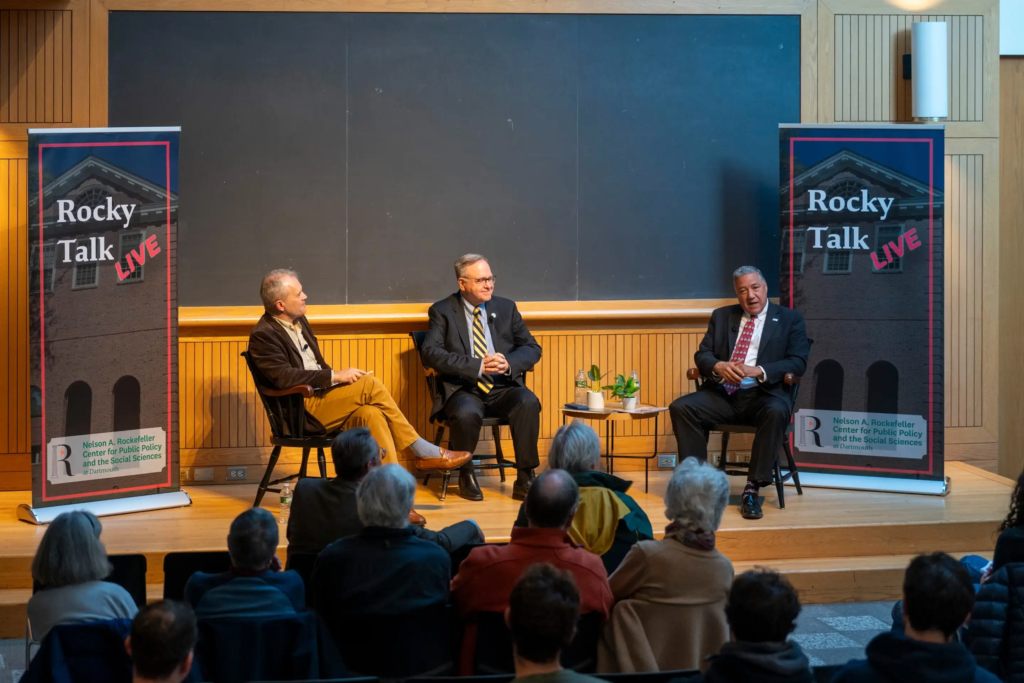
In what was a uniquely bipartisan forum, New Hampshire Democratic Party Chair Raymond Buckley and Republican Party Chair Chris Ager assembled at Dartmouth on Wednesday, November 1, to defend New Hampshire’s status as the first state in the union to hold a presidential primary.
Wednesday’s forum was not so much a debate between the two party chairs as an opportunity for both parties to collectively defend what is, in their words, an inculcated part of New Hampshire and a treasured part of the state’s culture.
When asked for reasons as to why New Hampshire ought to keep this seemingly esoteric practice, Buckley emphasized the utility of New Hampshire’s small size, which allows presidential candidates to feasibly visit and campaign in all ten counties. This allows for the final vote makeup to represent a state which has heard every candidate speak loudly and clearly. In no part of New Hampshire, according to Buckely, will a candidate lack adequate campaign time.
Buckley then discussed how he, a native Granite Stater, was able to get involved in politics at a young age thanks in large part to the grassroots style of campaigning that takes place in New Hampshire. Buckley was offered significant responsibility in Jimmy Carter’s successful 1976 campaign for president. As a reward for extensive work on the campaign, he was given permission to ride in the car with Carter to a campaign event—something which, admittedly, is a difficult scenario to imagine in a state other than New Hampshire, what with its small size and unique campaign culture.
Ager supplemented Buckley’s argument, adding that New Hampshire’s small size sets the state apart in its ability to allow residents to grill candidates aggressively on difficult issues, in a style known as “retail campaigning.” When on the campaign trail in the Granite State, candidates often find themselves in coffee shops and in one-horse-town city halls, scenarios ripe for very personal interaction with voters. During these one-on-one interactions, the people of New Hampshire have the opportunity to ask those campaigning for office the most pressing of local questions.
Ager went on to discuss how the voters of New Hampshire frown upon the idea of rehearsed speeches and the use of teleprompters. He offered an anecdote of an interaction with Sen. Tim Scott, a former candidate for the 2024 Republican nomination, in which Scott only connected with a swath of voters in a New Hampshire cafe when he went up to them, served them coffee, and spoke to them humbly as a fellow citizen. The interaction led those in the cafe to ask Scott point-blank questions such as “What would you do if China invaded Taiwan?”
According to both chairs, the ability of a candidate to respond to such blunt questions in a way that is forthright and that resonates well with voters is a prerequisite to success in the New Hampshire primary—and by extension, a prerequisite to success in running for president.
Ager and Buckley both emphasized the importance of allowing undeclared voters (which make up 40% of the electorate in New Hampshire) to participate in the primary process. Historically, the votes of undecideds have been able to swing the tide in the selection of primary candidate. In the year 2000, a large swath of the independent electorate in New Hampshire voted in the Republican primary for John McCain, something for which the Al Gore campaign similarly pushed to draw independent support away from Gore’s opponent, Bill Bradley. The swing succeeded in propelling Al Gore to the Democratic nomination as well as propping up John McCain as a serious threat to George W. Bush’s campaign.
Both party chairs steadfastly maintained that the retention of New Hampshire’s first-in-the-nation status is a bipartisan issue—one which both Republicans and Democrats in the state legislature are sure to vote almost unanimously on, regardless of whether or not the national committees of the parties agree.
After making their cases for New Hampshire’s right to keep its primary, both men offered examples of how the state has been able to completely reverse the trends of various primary battles, demonstrating how the state has lived up to its role as an indicator for candidates. Namely, Buckley spoke of Pete Buttigieg—the winner of the 2020 Iowa Caucus—who remained quiet and disengaged during the New Hampshire debate, sending him to sound defeat in New Hampshire and effectively scuttling his run for the nomination. Likewise, Ager spoke of the 2016 Republican primaries when Senator Marco Rubio suffered an embarrassing hiccup in the New Hampshire primary debate at the hands of Chris Christie, after which Rubio plunged from a serious contender for the nomination to an also-ran.
Both chairs, near the end of the moderated portion of the forum, took time to speak fondly of former President Ronald Reagan. Ager spoke of how Reagan’s ability to resonate with people is what sparked Ager’s plunge into the realm of politics. Buckley concurred, praising Reagan’s unique connection with young people and ability to inspire a calling to politics within many who otherwise would have remained uninvolved.
In a race as bitter and divisive as that which is brewing in New Hampshire, with both parties’ presidential primaries only months away, it was a breath of fresh air to see both the GOP and Democratic leaders able to resolutely agree. While leaders of both parties in other states may petition to reduce New Hampshire’s influential voice in the primary season, Buckley and Ager made themselves very clear that they would work to make sure the state’s voice is upheld. The political apparatus in New Hampshire will fight tooth and nail to retain the state’s first-in-the nation primary, which draws the country’s eyes to the Granite State every four years.

Be the first to comment on "NH Party Chairs Visit Dartmouth, Talk Presidential Primary"